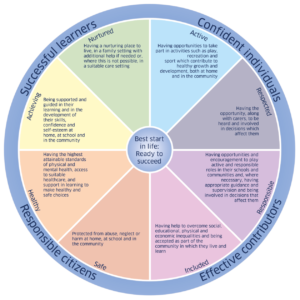What is Health & Wellbeing?
“Health is a state of complete physical, mental, and social wellbeing, not merely the absence of disease or infirmity.”
– World Health Organisation Constitution, 1946.
Within education, Health & Wellbeing is organised across a range of different subject areas:
- Mental, social, and physical wellbeing.
- Planning for choices and change.
- Physical education, activity, and sport.
- Food and health.
- Substance misuse.
- Relationships, sexual health, and parenthood.
In Early Years, Health & Wellbeing refers to the holistic approach towards a child’s development. Practitioners plan experiences based on the needs and interests of the child that promote social, emotional and cognitive learning alongside physical development.
Health & Wellbeing are different yet interdependent aspects of learning. A child is unlikely to reach their full potential, or ‘self-actualise’ if their basic needs are not met in the first instance. For example, a hungry child is unlikely to have the capacity to engage fully in learning. Equally, a child who is fearful can experience equivalent barriers.
Early years practitioners can help breakdown such barriers through positive, respectful, nurturing relationships.
GIRFEC – Getting it Right for Every Child
GIRFEC (Getting it Right for Every Child) is the national approach in Scotland towards improving outcomes for children. Promoting and supporting children’s wellbeing is GIRFEC’s fundamental basis.
In order to ensure that those who support children and families share a common understanding surrounding what wellbeing means, GIRFEC uses eight indicators, often referred to as SHANARRI.
these indicators support practitioners to remain consistent in how they consider the quality of a child’s life at a particular point in time.
Given that a child’s wellbeing is influenced by multiple factors, including the different experiences and needs they encounter during different times in their lives, these indicators support practitioners to remain consistent in how they consider the quality of a child’s life at a particular point in time.
Those working with children can use the indicators to identify what help a child requires in order to support them to access appropriate support.
Why does Health & Wellbeing matter?
“What is clear from the relentless widening of the gap between rich and poor is the fact that origins of health inequalities are complex and are to be found in the many interactions between social, economic, educational, and environmental determinants.”
– Health & Wellbeing: The Responsibility of All, 2013.
There is a close link between Health & Wellbeing and achievements in learning. Effective learning supports positive health and wellbeing, and positive levels of health and wellbeing support effective learning.
Health & Wellbeing is an important part of a child’s development as it supports children to develop knowledge, understanding, skills, capabilities, and attributes required for mental, emotional, social and physical wellbeing both now and in the future. Research highlights the importance of early life experiences for future outcomes, therefore, embedding these skills within an Early Years curriculum is vital.
In addition to supporting people to live longer and healthier lives, the promotion of health and wellbeing can help tackle some of the most significant health and social inequalities across society.
How can I support Health & Wellbeing?
“The interactions between an individual and the people and events which surround them are absolutely crucial to health and wellbeing.”
– Harry Burns, Chief Medical Officer for Scotland, 2011.
Early Years settings promote health and wellbeing by taking into account each individual child’s stage of growth and development. The role of the adult is a delicate balance between observing on the one hand and supporting and enriching on the other.
Positive, respectful, nurturing relationships enable practitioners to plan rich learning experiences across all curricular areas. Learners should have opportunities to make informed decisions to improve their mental, emotional, social and physical wellbeing.
Opportunities to learn about and be healthy can be found across all areas of the curriculum. However, opportunity for facilitation of learning experiences that promote ‘physical health’ can be found routinely and abundantly in the areas of outdoor play and healthy eating.
Outdoor Play
Realising the Ambition states that high-quality outdoor play experiences have a direct and positive impact on children’s physical, cognitive, mental, and emotional development. Notably, there is a direct link between a child’s movement and the development of co-ordination, motor, and concentration skills. Furthermore, Outdoor play can impact positively on wellbeing through the lessening of stress, anxiety, and the reduction of cortisol levels in the brain.
Given that outdoor, physical play opportunities that provide challenge and stimulation are crucial for positive future health outcomes, it is vital that practitioners both value and facilitate opportunities for children to access high-quality outdoor play experiences.
Healthy Eating
Routines such as snack times and personal hygiene should be viewed as valuable learning opportunities in which practitioners support and encourage children to learned important skills for life.
Snack and meal times provide opportunities beyond simply meeting nutritional needs. Eating together affords children the chance to develop language and communication skills in a meaningful social context whilst learning about the benefits of healthy eating. Additionally, snack and meal times afford a predictable and reassuring structure to the day.
For practitioners, taking the time to sit with children while they eat is both insightful and respectful, and offers a unique opportunity for getting to know them better.
Social interaction, respectful relationships and predictability can all impact positively on a child’s wellbeing, helping to improve self-esteem.


